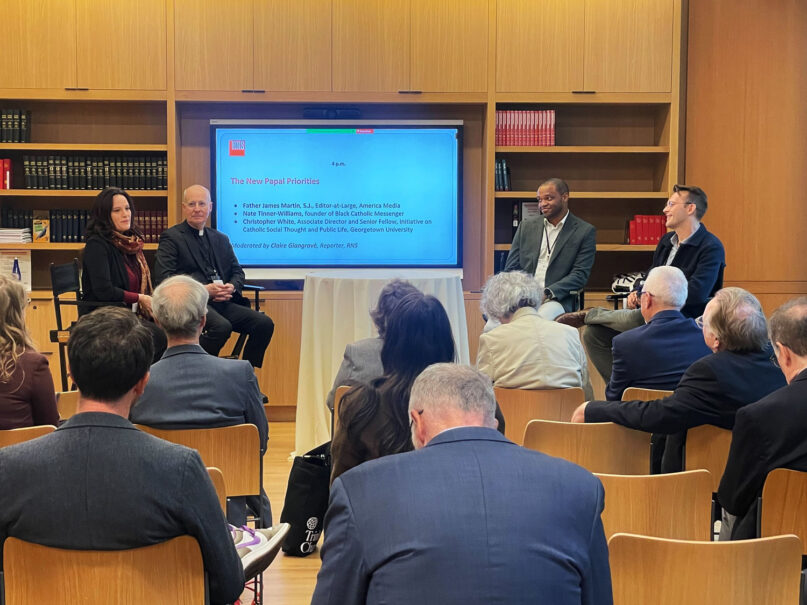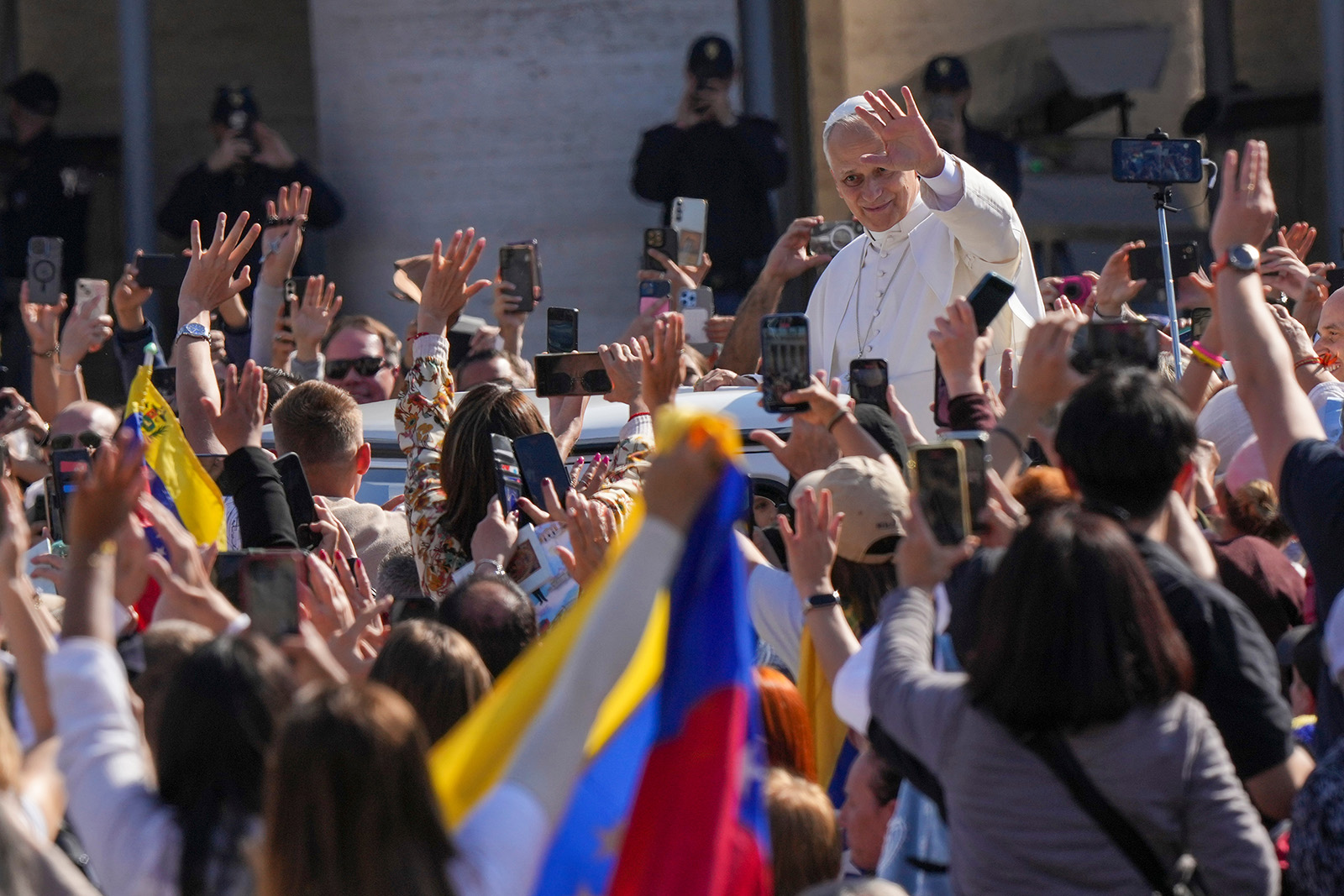NEW YORK (RNS) — Almost six months into his papacy, Pope Leo XIV is forging his own path in shaping the Catholic Church’s tone and priorities, Vatican experts said in a panel discussion on Wednesday (Oct. 22).
Speaking at Religion News Service’s symposium “God, Government and the Algorithm: The New Rules of Belief and Power” at Trinity Commons in New York City, three leading voices on Catholicism — the Rev. James Martin, a Jesuit priest and author; Christopher White, Georgetown University scholar and former National Catholic Reporter journalist; and journalist Nate Tinner-Williams, founder of Black Catholic Messenger — reflected on how the first United States-born pope is balancing continuity and change in a polarized church and world, moderated by Claire Giangravé, RNS Vatican reporter.
“I think the word I like best for him is reserved,” said Martin, who met with Pope Leo on Sept. 1 at the Vatican’s Apostolic Palace. The private meeting, held in the papal library, was widely viewed in Rome as a public reaffirmation of support for Martin and his pastoral ministry to LGBTQ+ Catholics.
When Martin asked Leo how he felt about his new position, the pope expressed a certain “serenity,” as Martin described it. “He said, ‘look, I believe that the Holy Spirit was behind this,’” Martin said. “‘So, why wouldn’t I be relaxed?’”
On questions of LGBTQ+ inclusion in the Catholic Church, Martin said the pope assured him he would continue Pope Francis’ approach of openness and welcomeness, though his immediate focus remains on political and humanitarian crises around the world. “He’s very focused on unity,” Martin said.
White agreed, noting that the pope’s focus on unity extends to how he manages his identity as the first American to lead the church. While Leo understands the historic significance of his nationality, White said the 70-year-old pope is careful not to let it eclipse the church’s global identity.

Four Vatican experts spoke on the first six months of Pope Leo XIV’s papacy and the path he is paving for the Catholic Church during a panel titled “God, Government and the Algorithm: The New Rules of Belief and Power.” From left, RNS reporter Claire Giangravé, Jesuit priest and author Rev. James Martin, journalist and founder of “Black Catholic Messenger” Nate Tinner-Williams, and Georgetown University scholar and former National Catholic Reporter journalist Christopher White. RNS photo by Fiona Murphy
“I think we’ve seen a reluctance on his part to lean into the fact that he’s an American,” White said. “He’s aware that the world’s largest superpower could diminish the global diversity of the church, and he doesn’t want that to be the reality. That being said, he’s attentive to the matters in his home country.”
The pope wears an Apple Watch that delivers updates throughout the day, and he speaks regularly with his brother in Chicago, White said. That grounding, he added, connects with Leo’s approach to world affairs. “He knows exactly what’s happening in this country, and he’s being selective about how he uses, I guess, this global megaphone,” White said. “In the past few weeks, he has begun to find his voice and speak out in a much more regular way about matters that are in his own backyard but do affect the global church.”
RELATED: Hispanic evangelical Trump adviser says he may not endorse candidates in the future
For Tinner-Williams, Leo’s approach to unity raises concern. He said if the pope hopes to heal divisions in the church that reflect the political polarization of the West, it will be difficult to do so without a more outspoken approach.
“I don’t think you can get to healing with that sort of strategy,” Tinner-Williams said. “If that’s his larger view of divisive issues, I think it will pose a problem for him in the future.”
While Leo’s style may be more subdued than Francis’ charismatic and outspoken approach to leadership, the three panelists agreed that his moral focus is unmistakable. Tinner-Williams said the pope’s first apostolic exhortation, “Dilexi Te,” which traces the church’s concern for the poor from Jesus to the present, left him “amazed.”
“(The pope is) saying that care for the poor and also for the sick is not just a major feature of Christianity, but that it is at the heart of Christianity,” Tinner-Williams said. “That there is no Christianity if you are not centering care for the poor, which I find fascinating.”
The exhortation, he said, celebrates women and the poor as bearers of wisdom and challenges the church to empower communities in the Global South.
The pope’s anticipated first encyclical, the panelists suggested, could blend classic social-teaching themes like work, wealth and dignity with modern concerns like artificial intelligence and staggering wealth inequality.
RELATED: Pope Leo calls on Catholics to care for the poor in first official exhortation
When the discussion turned to immigration, Martin said Leo has been surprisingly outspoken. In a recent meeting with El Paso, Texas, Bishop Mark Seitz, Leo urged U.S. bishops to take a stronger stand in support of migrants. “For someone who is reserved and moderate, who might say, I don’t want to get involved in something political,” Martin said. “He’s been very political. He’s been very strong on that.”
The pope’s directness, he added, reflects both his American awareness and his Augustinian roots, qualities that distinguish him from Francis, who was sometimes seen as less understanding of realities in the U.S. “You can’t say that about Robert Prevost,” Martin said. “He understands the United States.”
His distinctive empathy for immigrants, Tinner-Williams noted, may come from his own personal history. Leo, born in Chicago, recently learned his lineage includes Black and Creole ancestors.

Nate Tinner-Williams speaks during a panel on what the future holds with the new Pope during a panel with three additional Vatican experts. RNS photo by Fiona Murphy
“I found a video of him speaking, I think, just months before he was elected as pope, about his ancestors, and he said all of his grandparents were immigrants, so apparently he didn’t know that one of his grandparents was not an immigrant at all but descended from mixed-race Black people in Louisiana,” said Tinner-Williams, who was the first journalist in the U.S. to uncover Leo’s lineage. “Being able to help share that story right after his election was amazing, not least because I had been hoping for a Black pope, then we got this American guy and he’s Black-ish, to tell that story. And (it) really is, I would say, quite an American story.”
Toward the end of the panel, Giangravé was asked about Vatican finances, and she reminded the audience that Leo still faces these steep and earthly challenges. “A $90 million deficit means something different to an American than to a European pope,” she said. The Vatican has faced persistent financial strain in recent years, with deficits driven by rising administrative costs and shrinking donations, plus the lingering effects of the COVID-19 pandemic. But, Giangravé said, that doesn’t seem to worry Leo.
“I think that an American pope has a huge appeal for many wealthy Catholic donors who have been looking for a pope that they can put all their financial weight behind,” Giangravé said. “In this first year, it’s going to be a test of the success of an American pope and what it might mean for Vatican finances. And I’m really curious to see where it goes.”
At that point, someone muttered from the audience, “Well, that is a bit concerning.”
As the conversation concluded, White said Pope Leo’s greatest test may lie in whether he can make Catholics feel represented across ideological, cultural and geographic lines. But a conviction to do so, White said, is what drives the pope’s commitment to the synodal process, emphasizing an effort to build a church that listens as much as it leads. “He’s made clear this is the direction of travel,” White said. “The question is, are you going to come along on the journey?”



